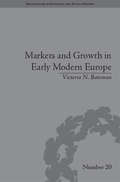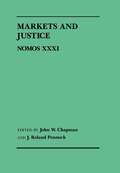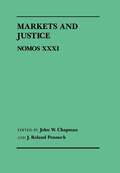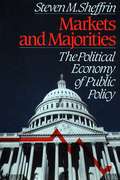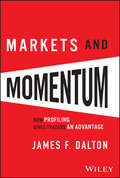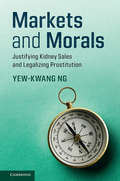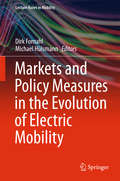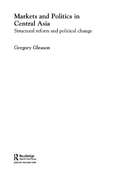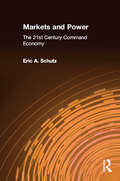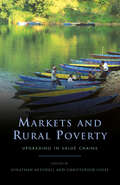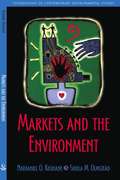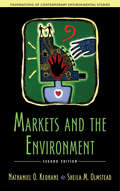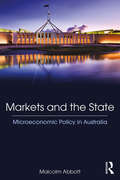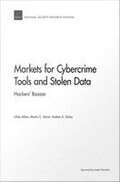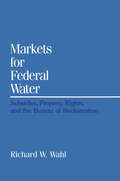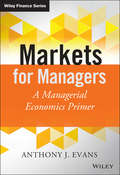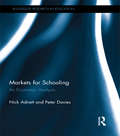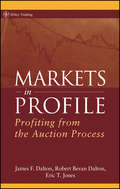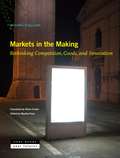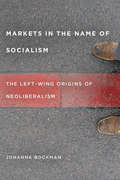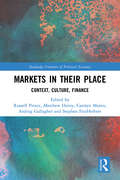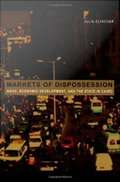- Table View
- List View
Markets and Growth in Early Modern Europe (Perspectives in Economic and Social History #20)
by Victoria N BatemanThis is the first study to analyze a wide spread of price data to determine whether market development led to economic growth in the early modern period.
Markets and Justice: Nomos XXXI (NOMOS - American Society for Political and Legal Philosophy #5)
by John W. Chapman J. Roland PennockIn this thirty-first annual volume in the American Society of Legal and Political Philosophy's NOMOS series, entitled Markets and Justice, a number of distinguished authors consider a variety of topics in the area where economics, philosophy, and political science join paths. Included are essays such as "Contractarian Method, Private Property, and the Market Economy," "Justice Under Capitalism," and "Market Choice and Human Choice." Authors include Joshua Cohen, MIT; Gerald F. Gaus, University of Queensland; Margaret Jane Radin, University of Southern California; and Andrzej Rapaczynski, Columbia University.Part of a well-known and important series, Markets and Justice will prove invaluable to political scientists, legal scholars, philosophers, and their students.Part of a well-known and important series, Markets and Justice will prove invaluable to political scientists, legal scholars, philosophers, and their students.
Markets and Justice: Nomos XXXI (NOMOS - American Society for Political and Legal Philosophy #5)
by John W. Chapman J. Roland PennockIn this thirty-first annual volume in the American Society of Legal and Political Philosophy's NOMOS series, entitled Markets and Justice, a number of distinguished authors consider a variety of topics in the area where economics, philosophy, and political science join paths. Included are essays such as "Contractarian Method, Private Property, and the Market Economy," "Justice Under Capitalism," and "Market Choice and Human Choice." Authors include Joshua Cohen, MIT; Gerald F. Gaus, University of Queensland; Margaret Jane Radin, University of Southern California; and Andrzej Rapaczynski, Columbia University.
Markets and Majorities
by Steven M. SheffrinAmerica's government intervenes in almost every aspect of its citizens' daily lives. From the air we breathe, to our health, wealth, and security, Americans wade through a vast political ocean. Unfortunately, we do so blindly; few Americans understand how or why our government regulates the market mechanisms that surround us. In Markets and Majorities, Steven Sheffrin addresses essential yet overlooked questions about political intervention in economic spheres. Why should we trust the government to clean our air? How do we know what to define as clean? What kind of health insurance business will the government run? What are the dangers of publicly financed doctors? Sheffrin first explains traditional theories of market failure, used to justify intervention. He then combines the crucial question of political viability with the fascinating particulars of policy histories. Sheffrin applies such analysis to the areas of health care, social security, environmental policy, product liability, trade policy, and fiscal and budgetary policy. He argues that beneath each area lies a unique calculus of market failure and political pressures, and convincingly demonstrates that no single policy can be understood out of economic and political context. In short, the fact that markets may fail does not guarantee that politics will succeed. By examining both sides of each policy area, Sheffrin's careful review of our national policy-making reveals a minefield where, in many cases, politics cannot help but fail as badly as markets. However, he shows that all is not lost, citing, among other examples, political intervention in the medical industry as the only hope of stopping hospitals from competitive purchases of useless technology. Markets and Majorities is must reading for anyone who has ever wondered why government just can't seem to get things done, as well as anyone who has asked why it should try in the first place.
Markets and Market Places in Medieval Italy c. 1100 to c. 1440
by Dennis RomanoCathedrals and civic palaces stand to this day as symbols of the dynamism and creativity of the city-states that flourished in Italy during the Middle Ages. Markets and Marketplaces in Medieval Italy argues that the bustling yet impermanent sites of markets played an equally significant role, not only in the economic life of the Italian communes, but in their political, social, and cultural life as well. Drawing on a range of evidence from cities and towns across northern and central Italy, Dennis Romano explores the significance of the marketplace as the symbolic embodiment of the common good; its regulation and organization; the ethics of economic exchange; and how governments and guilds sought to promote market values. With a special focus on the spatial, architectural, and artistic elements of the marketplace, Romano adds new dimensions to our understanding of the evolution of the market economy and the origins of commercial capitalism and Renaissance individualism.
Markets and Measurements in Nineteenth-Century Britain
by Aashish VelkarMeasurements are a central institutional component of markets and economic exchange. By the nineteenth century, the measurement system in Britain was desperately in need of revision: a multiplicity of measurement standards, proliferation of local or regional weights and measures, and a confusing array of measurement practices made everyday measurements unreliable. Aashish Velkar uncovers how metrology and economic logic alone failed to make 'measurements' reliable, and discusses the importance of localised practices in shaping trust in them. Markets and Measurements in Nineteenth-Century Britain steers away from the traditional explanations of measurement reliability based on the standardisation and centralisation of metrology; the focus is on changing measurement practices in local economic contexts. Detailed case studies from the industrial revolution suggest that such practices were path-dependent and 'anthropocentric'. Therefore, whilst standardised metrology may have improved precision, it was localised practices that determined the reliability and trustworthiness of measurements in economic contexts.
Markets and Momentum: How Profiling Gives Traders an Advantage
by James F. Dalton Robert B. DaltonElevate your trading strategy with actionable market insights from an industry pioneer In Markets & Momentum: How Profiling Gives Traders an Advantage, James F. Dalton and co-author Robert B. Dalton dramatically expand on their revolutionary first book, Markets in Profile. Summarizing a lifetime of experience—from formative memberships on the CBOE and CBOT to his role as UBS Director of Hedge Fund Research—Jim challenges traders to recognize that market-understanding must be balanced with self-understanding. Jim’s deep market savvy is complimented by Rob’s engaging prose that adds a wealth of insight about the powerful influence of unexamined emotions, impulses, and habits on your trading success. Jim promotes trader education through Jim Dalton Trading (jimdaltontrading.com), along with his partners Jennifer Loh and Raghu Rajput, driven by the knowledge that the only reliable, objective, actionable information is market-generated. This information is scientifically organized via the Market Profile, which is simply a contextual organization of time, price, and volume—the core components of any financial transaction. Markets & Momentum offers: Deep dives into issues that lead more than 90% of day traders to lose money, including fading trend days, FOMO, doubling down on losing trades, and failing to let profits run. Strategies for minimizing the influence of news hype and analysis overload in order to remain focused on the only information that matters. Techniques for understanding your own emotional and intuitive reactions, and learning to avoid making impulsive decisions. This book is ideal for day and short-term traders, and for longer-term investors seeking to improve trade entries and exits. Jim Dalton’s trading insights are supported by six decades of learning directly from the markets, as well as from his wide base of educational clients. Markets & Momentum is a must-read for traders looking for guidance on developing the insights and skills necessary for conquering the short-term market.
Markets and Morals: Justifying Kidney Sales and Legalizing Prostitution
by Yew-Kwang NgConsidering efficiency, equality, and morality, this book argues for qualified market expansion, particularly in legalizing kidney sales and prostitution. Legalizing prostitution will benefit both men and women, as argued in a chapter jointly written with Yan Wang. Blood donation without monetary compensation can still result in adequate blood supply if schools educate children that blood donation can actually benefit a donor's health. As a society becomes more advanced, with higher incomes and a better educated populace, more activities can be subject to market exchange, with gradual popular acceptance. Without serious misinformation and irrationality, inequality/fairness as such cannot be a valid reason for limiting the scope of the market. The book supports the use of markets to increase efficiency while also increasing the effort to promote equality, making all income groups better off.
Markets and Policy Measures in the Evolution of Electric Mobility
by Dirk Fornahl Michael HülsmannThis edited monograph collects theoretical, empirical and political contributions from different fields, focusing on the commercial launch of electric mobility, and intending to shed more light on the complexity of supply and demand. It is an ongoing discussion, both in the public as well as in academia, whether or not electric mobility is capable of gaining a considerable market share in the near future. The target audience primarily comprises researchers and practitioners in the field, but the book may also be beneficial for graduate students.
Markets and Politics in Central Asia (Economies In Transition To The Market Ser. #Vol. 2)
by Gregory GleasonOver a decade after national independence, it is apparent that the contrasting development strategies adopted by the five new governments of Central Asia have led to significantly different outcomes. This well-written and timely book analyses how the development strategies of these countries have affected their transition from communist governance.
Markets and Power: The 21st Century Command Economy
by Eric A. SchutzIn what ways do the actions and economic behavior of today's multinational corporations resemble the functioning and processes of the old command economics of the Soviet Union? By ignoring questions about power relations in markets, mainstream neoclassically-oriented economists conclude that there are no significant power structures operating in market systems to control allocation and distribution. This book argues to the contrary that there are fundamental and systemic power structures - monopoly, access to information or finance, employer power, etc. - at work in market economies, which affects their ability to achieve real "competition" in much the same way as state-controlled, command economies hinder business activities. Thus, for example, the biggest firms at the hubs of financial "networks" wield a kind of "shaping power" upon large numbers of relatively autonomous firms, not only upon those that belong to the networks but also on the many firms outside them that are also affected.
Markets and Rural Poverty: Upgrading in Value Chains
by Jonathan Mitchell Christopher ColesThis book explores the place of poor people within a rich variety of value chains, focusing upon lagging, rural regions in Africa and Asia, and how they can 'upgrade' within such chains. Upgrading is a key concept for value chain analysis and refers to the acquisition of technological capabilities and market linkages that enable firms to improve their competitiveness and move into higher-value activities. The authors examine a range of evidence to assess whether the 'bottom billion' people, living mainly in the rural areas of low-income countries, can improve their position through productive strategies and, if so, how? They propose an innovative conceptual framework of value chain upgrading for some of the most marginal producers in the poorest local economies. They demonstrate how interventions can improve poverty and the environment for poor people supplying a wide range of services and agricultural and food products to local, regional and global markets. This analysis is based on empirical research conducted in Senegal, Mali, Tanzania, India, Nepal, Philippines and Vietnam. The main focus is on poverty, environment and gender outcomes of upgrading interventions, and represents one of the key challenges of contemporary development economics.
Markets and the Environment
by Nathaniel O. Keohane Sheila M. OlmsteadThis book provides a concise introduction to the economic theory of environmental policy and natural resource management. Like the other volumes in the series Foundations of Contemporary Environmental Studies, this book is a self-contained treatment of one aspect of the interaction between human society and the natural world.
Markets and the Environment, Second Edition (Foundations Contemporary Environmental)
by Dr Sheila M. Olmstead Mr Nathaniel O. KeohaneA clear grasp of economics is essential to understanding why environmental problems arise and how we can address them. So it is with good reason that Markets and the Environment has become a classic text in environmental studies since its first publication in 2007. Now thoroughly revised with updated information on current environmental policy and real-world examples of market-based instruments, the primer is more relevant than ever.The authors provide a concise yet thorough introduction to the economic theory of environmental policy and natural resource management. They begin with an overview of environmental economics before exploring topics including cost-benefit analysis, market failures and successes, and economic growth and sustainability.Readers of the first edition will notice new analysis of cost estimation as well as specific market instruments, including municipal water pricing and waste disposal. Particular attention is paid to behavioral economics and cap-and-trade programs for carbon.Throughout, Markets and the Environment is written in an accessible, student-friendly style. It includes study questions for each chapter, as well as clear figures and relatable text boxes. The authors have long understood the need for a book to bridge the gap between short articles on environmental economics and tomes filled with complex algebra. Markets and the Environment makes clear how economics influences policy, the world around us, and our own lives.
Markets and the State: Microeconomic Policy in Australia
by Malcolm AbbottThis book illustrates essential microeconomic concepts and theories through the examination of related policy formulation in Australia since the 1980s. It provides a fresh approach to the subject of microeconomics from the perspective of both market and government failures. By looking at how Australia has transformed over the course of time, the book traces and tracks these changes and relates them to the broader microeconomic reforms. It also looks at the structure of Australian economic public policy formulation and process. The book uses standard microeconomic techniques to analyse the impact of these Australian policies and examines the role of government in the implementation of these policies, making it a very useful teaching vehicle for learning about microeconomics and microeconomic policies.
Markets for Cybercrime Tools and Stolen Data: Hackers' Bazaar
by Martin C. Libicki Lillian Ablon Andrea A. GolayCriminal activities in cyberspace are increasingly facilitated by burgeoning black markets for both tools (e.g., exploit kits) and take (e.g., credit card information). This report, part of a multiphase study on the future security environment, describes the fundamental characteristics of these markets and how they have grown into their current state to explain how their existence can harm the information security environment. Understanding the current and predicted landscape for these markets lays the groundwork for follow-on exploration of options to minimize the potentially harmful influence these markets impart. Experts agree that the coming years will bring more activity in darknets, more use of crypto-currencies, greater anonymity capabilities in malware, and more attention to encrypting and protecting communications and transactions; that the ability to stage cyberattacks will likely outpace the ability to defend against them; that crime will increasingly have a networked or cyber component, creating a wider range of opportunities for black markets; and that there will be more hacking for hire, as-a-service offerings, and brokers. Experts disagree, however, on who will be most affected by the growth of the black market (e.g., small or large businesses, individuals), what products will be on the rise (e.g., fungible goods, such as data records and credit card information; non-fungible goods, such as intellectual property), or which types of attacks will be most prevalent (e.g., persistent, targeted attacks; opportunistic, mass "smash-and-grab" attacks).
Markets for Federal Water: Subsidies, Property Rights, and the Bureau of Reclamation
by Richard W. WahlThis book clearly and authoritatively addresses significant issues of water policy in the western United States at a time when the growing scarcity of western water and the role of the Bureau of Reclamation in the allocation of that resource are becoming increasingly urgent issues. In this scholarly study, Wahl combines his insider's knowledge of the Interior Department's dam-building, regulatory, and water-pricing decisions with an objective analysis of the efficiency dilemma. The study begins by tracing the origins of the reclamation idea and the expansion of subsidies in the program since 1902. The author then recommends major changes in reclamation law and in the Bureau of Reclamation's policies for administering its water supply contracts. He uses four case studies to illustrate the application and potential benefits of his proposals.
Markets for Managers: A Managerial Economics Primer
by Anthony J. EvansSuccessful managers possess an understanding of economic and market principles as they relate to business itself. Markets for Managers presents managerial economics in a casual, accessible format that will help management professionals take economic realities into account when running their companies or divisions. The book takes a global perspective while covering the full range of micro- and macroeconomic principles that managers around the world need to know. Complete with online resources that include further reading and a YouTube playlist, this guide puts business management practice within its economic context to produce a practical tool for managers. By understanding market operation and what might cause market failure, management professionals can lead companies that respond to market pressures and align operating strategies with economic realities. Monetary and fiscal policies affect businesses of all sizes, and in Markets for Managers, business leaders can learn how to read the ever-shifting fiscal landscape.
Markets for Schooling: An Economic Analysis (Routledge Research In Education Ser. #No.5)
by Peter Davies Nick AdnettNick Adnett and Peter Davies develop an economic analysis of schooling markets, emphasizing both the strengths and weaknesses of orthodox analyses. They explain the economic and social contexts that have generated the widespread desire to reform state schooling and develop a systematic analysis of the key policy components examining both theory and
Markets in Fashion: A phenomenological approach (Routledge Studies in Business Organizations and Networks #Vol. 31)
by Patrik AspersInterest in contemporary cultural industries has grown in the past decade, as they take on a greater significance in our increasingly consumer-led society. Focusing on the world of fashion photography, this book presents an interdisciplinary approach in which this and other aesthetic markets, such as advertising, modelling, art, music and more, can be viewed. The main thrust of this groundbreaking book, is in developing a theory for these cultural markets, characterized by insecurity, and where status and aesthetic diversity generate order and price differentiation. In these industries, services and products are offered that are a mix of the aesthetic and the economic, and for fashion photographers such as those studied here, it is necessary to carefully position themselves in the market by developing unique photographic styles and separating themselves from competitors. Yet the markets in which these industries operate differ from the type of exchange markets depicted by neoclassical economists, and therefore cannot be considered using such modes of analysis. Instead Aspers conducts his study using empirical phenomenology, an original approach presented here for the first time, which can be easily used in other empirical studies. He draws on original empirical material; participant observation and interviews generated in New York and Stockholm; which bring a depth of analysis and a relevance to this book which academics, researchers and those with a vested interest in such industries will value. Written by one of the world's brightest young economic sociologists, this fascinating book (previously published in Sweden and enthusiastically received) is endorsed by recognized industry authorities. A noteworthy book, it provides a foothold in the burgeoning sub discipline of economic sociology, and a significant analysis of the economics of the fashion photography industry.
Markets in Profile
by James F. Dalton Robert B. Dalton Eric T. JonesMarkets in Profile explores the confluence of three disparate philosophical frameworks: the Market Profile, behavioral finance, and neuroeconomics in order to present a unified theory of how markets work. The Market Profile is an ever-evolving, multidimensional graphic that gives visual form to the market's continuing auction process, revealing the myriad underlying dynamics that influence market activity. Behavioral finance posits that investors are driven more by emotional factors and the subjective interpretation of minutia than by "rationality" when making investment decisions. And neuroeconomics is the study of how investor psychology permeates and affects the financial markets. Mr. Dalton explicates the ways in which irrational human behavior influences the market's natural auction process, creating frequently predictable market structure, which results in opportunities for investors to ameliorate risk. The book will improve investors ability to interpret change in markets, enabling better, more confident investment decisions.
Markets in the Making: Rethinking Competition, Goods, and Innovation (Near Future Series)
by Michel CallonSlicing through blunt theories of supply and demand, Callon presents a rigorously researched but counterintuitive model of how everyday market activity gets produced.If you’re convinced you know what a market is, think again. In his long-awaited study, French sociologist and engineer Michel Callon takes us to the heart of markets, to the unsung processes that allow innovations to become robust products and services. Markets in the Making begins with the observation that stable commercial transactions are more enigmatic, more elusive, and more involved than previously described by economic theory. Slicing through blunt theories of supply and demand, Callon presents a rigorously researched but counterintuitive model of market activity that emphasizes what people designing products or launching startups soon discover—the inherent difficulties of connecting individuals to things. Callon’s model is founded upon the notion of “singularization,” the premise that goods and services must adapt and be adapted to the local milieu of every individual whose life they enter. Person by person, thing by thing, Callon demonstrates that for ordinary economic transactions to emerge en masse, singular connections must be made.Pushing us to see markets as more than abstract interfaces where pools of anonymous buyers and sellers meet, Callon draws our attention to the exhaustively creative practices that market professionals continuously devise to entangle people and things. Markets in the Making exemplifies how prototypes, fragile curiosities that have only just been imagined, are gradually honed into predictable objects and practices. Once these are active enough to create a desired effect, yet passive enough to be transferred from one place to another without disruption, they will have successfully achieved the status of “goods” or “services.” The output of this more ample process of innovation, as redefined by Callon, is what we recognize as “the market”—commercial activity, at scale.The capstone of an influential research career at the forefront of science and technology studies, Markets in the Making coherently integrates the empirical perspective of product engineering with the values of the social sciences. After masterfully redescribing how markets are made, Callon culminates with a strong empirical argument for why markets can and should be harnessed to enact social change. His is a theory of markets that serves social critique.
Markets in the Name of Socialism
by Johanna BockmanThe worldwide spread of neoliberalism has transformed economies, polities, and societies everywhere. In conventional accounts, American and Western European economists, such as Milton Friedman and Friedrich von Hayek, sold neoliberalism by popularizing their free-market ideas and radical criticisms of the state. Rather than focusing on the agency of a few prominent, conservative economists,Markets in the Name of Socialismreveals a dialogue among many economists on both sides of the Iron Curtain about democracy, socialism, and markets. These discussions led to the transformations of 1989 and, unintentionally, the rise of neoliberalism. This book takes a truly transnational look at economists' professional ideas over 100 years across the capitalist West and the socialist East. Clearly translating complicated economic ideas and neoliberal theories, it presents a significant reinterpretation of Cold War history, the fall of communism, and the rise of today's dominant economic ideology.
Markets in their Place: Context, Culture, Finance (Routledge Frontiers of Political Economy)
by Russell PrinceMarkets are usually discussed in abstract terms, as an economic organizing principle, a generalized alternative to government planning, or even as powerful actors in their own right, able to shape local and national economic destinies. But markets are not abstract. Even as the idea of the market seduces politicians around the world to take advantage of their abstract qualities, they constantly run up against material reality. Markets are always somewhere, in place, and it is in place that the smooth theories of markets falter and fail. More than simply being embedded in particular places, markets necessarily emerge in the various political, social, cultural, and environmental relations that exist in and between places. Markets shape places, but the reverse is also true. This collection of essays approaches markets from the ground up, and from a part of the world often still regarded as peripheral to global capitalism: the South Pacific. With a wide variety of case studies, including on indigenous economies, childcare, agriculture, wine, electricity metering, finance, education, and housing, the authors show how complex local, social and cultural politics matter to how markets are made within and between places, and the insights that can be gleaned from studying markets in this part of the world. They explore the way superficially similar markets work out differently in different places, and why, as well as examining how market relations are constructed in places outside and on the edges of the centres of Western capitalism, and what this says back to how markets are understood in those centres. The book will be of particular interest to scholars and students working in and between economic geography, cultural economy, political economy, economic sociology, and more.
Markets of Dispossession: Ngos, Economic Development, and the State in Cairo
by Julia ElyacharWhat happens when the market tries to help the poor? In many parts of the world today, neoliberal development programs are offering ordinary people the tools of free enterprise as the means to well-being and empowerment. Schemes to transform the poor into small-scale entrepreneurs promise them the benefits of the market and access to the rewards of globalization. Markets of Dispossession is a theoretically sophisticated and sobering account of the consequences of these initiatives. Julia Elyachar studied the efforts of bankers, social scientists, ngo members, development workers, and state officials to turn the craftsmen and unemployed youth of Cairo into the vanguard of a new market society based on microenterprise. She considers these efforts in relation to the alternative notions of economic success held by craftsmen in Cairo, in which short-term financial profit is not always highly valued. Through her careful ethnography of workshop life, Elyachar explains how the traditional market practices of craftsmen are among the most vibrant modes of market life in Egypt. Long condemned as backward, these existing market practices have been seized on by social scientists and development institutions as the raw materials for experiments in "free market" expansion. Elyachar argues that the new economic value accorded to the cultural resources and social networks of the poor has fueled a broader process leading to their economic, social, and cultural dispossession.
